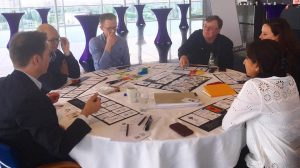We often talk about doing things in the interest of the “common good”. But is there a vision of the “common good” that everyone agrees with? And what would this vision look like?
I worked with the Shell strategy team to design a game to help answer these questions. The game is based on a thought experiment by John Rawls called the “Veil of Ignorance”. In this experiment, Rawls puts participants in what he calls the “Original Position”:
Rawls argued that, put in this position and asked to design an ideal society, people would come up with rules that were inherently fair.

We tried to recreate this in the Common Good Game. Players have to choose policies at the beginning of the game, and afterwards they are given a character and have to try to achieve personal and societal goals under the policies they chose. Each character has different abilities, opportunities and goals, and so players may come to regret their policy decisions!
The game works to stimulate discussion around these issues and to help players put themselves in the shoes of a wide variety of people.
